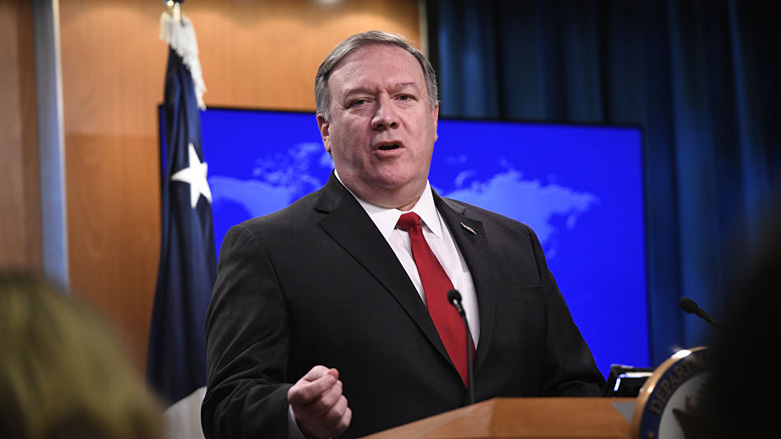Pompeo rebuffs Turkey over warning on Syria

WASHINGTON DC (Kurdistan24) – On Thursday, US Secretary of State, Mike Pompeo, reaffirmed the State Department’s tough language in its read-out, summarizing Pompeo’s meeting with Turkish Foreign Minister Mevlut Cavusoglu the day before.
The statement issued by the State Department on Wednesday included wording that suggested the US was prepared to respond militarily to any Turkish attack on America’s Kurdish allies in Syria.
According to the US read-out, Pompeo warned Cavusoglu “of the potentially devastating consequences of unilateral Turkish military action” in northeastern Syria, while Pompeo also complained about Turkey’s plans to purchase the S-400 and its unjustified detention of US citizens.
Without offering any specifics, Turkish Foreign Ministry spokesman Hami Aksoy charged later on Wednesday that the US read-out failed “to reflect the content of the meeting” and included “matters that were not even raised.”
Yet the following day, on Thursday, Pompeo unequivocally dismissed Turkey’s protest.
“I saw the comments of my Turkish counterpart,” Pompeo said, and “I re-read the read-out of our meeting.” He then paused, before affirming: “Spot-on. Stand by every word of it.”
Turkey did clarify on Thursday what it found objectionable in the State Department read-out: the section on Syria, in which the US appeared to threaten Turkey with military action.
“Such language was never used,” Cavusoglu claimed in a press conference in Washington, where he was attending the NATO Foreign Ministers’ Conference. “In Syria, particularly, they never mentioned such things about the unilateral actions of Turkey.”
"We just agreed to continue working together through this task force and also joint working group,” Cavusoglu said. “Jim Jeffrey comes to Turkey very often,” he added, referring to Amb. James Jeffrey, the US Special Representative for Syria Engagement, as well as Special Envoy for the Global Coalition to Defeat ISIS.
Yet Turkey has been threatening to attack northeast Syria, where US, French, and British troops are based, along with the Kurdish-led Syrian Democratic Forces (SDF), the Coalition’s main ally in Syria in the fight against ISIS.
Earlier on Thursday, Turkey’s Daily Sabah reported that Turkey “had completed preparations for a cross border operation” in Syria, east of the Euphrates River, and it quoted an anonymous Turkish military source, "We are waiting for instructions of the government for the military operation.”
Paul Davis, a former Pentagon analyst and currently a Senior Fellow at Soran University, noted the strong language of the State Department read-out, advising Kurdistan 24 that it sounded very much like a threat to respond militarily, and in a serious way, to any Turkish attack in northeast Syria.
He said that Cavusoglu’s protest “comes across as a bit disingenuous,” particularly in light of the Turkish threats. He also suggested that US officials may well be concerned that Turkey’s President Recep Tayyip Erdogan might try to compensate for his recent electoral defeats in Istanbul and Ankara by attacking the Kurds.
“That’s not how the US would threaten economic sanctions,” Davis said. It was “absolutely” the threat of military action, and it was the first time the US had publicly threatened Turkey in such a way.
The US government-funded broadcaster, Radio Free Europe/Radio Liberty, described the highly unusual exchange between Pompeo and Cavusoglu as an intensifying “war of words.”
The US and Turkey are also sharply divided over Ankara’s intent to purchase the Russian air defense system, the S-400. In Washington, Cavusoglu proposed to establish “a technical team or a joint working group” to find a way for Turkey to operate the S-400, without endangering NATO aircraft.
The Pentagon, however, quickly dismissed the notion, saying "a technical working group at this stage is not necessary or a path the United States is considering as a resolution.”
As much as the State Department’s read-out might have offended Turkish officials with its threat of military action, a more serious statement was made by Vice President Mike Pence, raising a question over Turkey’s continued involvement in NATO.
“Turkey must choose,” Pence warned on Wednesday, as he strongly criticized its planned S-400 purchase. “Does it want to remain a critical partner in the most successful military alliance in history, or does it want to risk the security of that partnership by making reckless decisions that undermine our alliance?”
Editing by Nadia Riva
